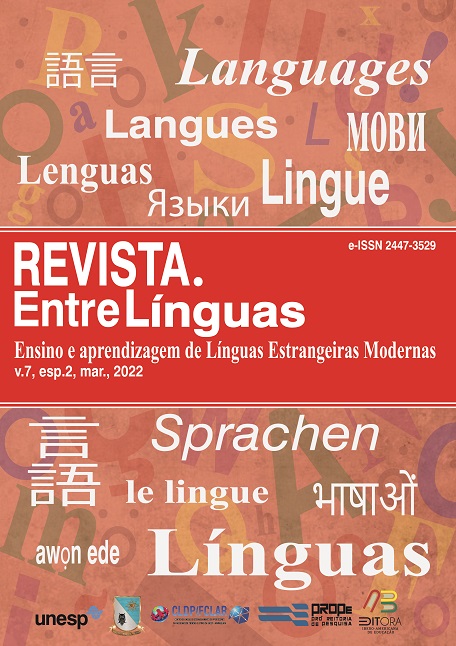Evaluative and quality assessment nominations in the Yakut Linguoculture
DOI:
https://doi.org/10.29051/el.v8iesp.2.17312Keywords:
Linguistic consciousness, Associative field, Yakut linguoculture, National and cultural specificsAbstract
The article considers the national and cultural specifics of evaluative and quality assessment nominations in the Yakut linguoculture. The results of a free associative experiment highlight the systemic nature of images in a person's linguistic consciousness, as well as the national characteristics of words in the Yakut culture. The experiment materials representing a fragment of a person's verbal memory reveal the systemic nature of associative and semantic connections based on syntagmatic and paradigmatic relationships. It is necessary to associations that have special semantics, including a wide cultural and historical background. Extensive associative and semantic links develop both stable traditions and the peculiarities of mindset: devotion to the origins revealing the deep meaning of each word. Evaluative nominations as part of the language can become the key to understanding a person and their values-based worldview.
Downloads
References
ARUTYUNOVA, N. D. Aksiologiya v mekhanizmakh zhizni i yazyka [Axiology in the mechanisms of life and language]. Moscow: Nauka, 1984.
BARDINA, N. V. Yazykovaya garmonizatsiya soznaniya [The linguistic harmonization of consciousness]. Odessa, 1997.
BOGUSLAVSKII, V. M. Chelovek v zerkale russkoi kultury, literatury i yazyka [A person in the mirror of the Russian culture, literature and language]. Moscow: Izd-vo "Kosmopolis", 1994.
BOLSHOI tolkovyi slovar yakutskogo yazyka [THE GREAT Dictionary of the Yakut language]. Novosibirsk: Nauka, 2004-2018. Available in: https://sakhatyla.ru. Access in: 12 Feb. 2022.
GERASIMOVA, E. S. Kategoriya mnozhestvennosti v funktsionalnykh stilyakh yakutskogo yazyka [The plurality category in the functional styles of the Yakut language]. 2012. Thesis (Candidate Degree in Philolosophical Sciences) –Yazyki narodov Rossiiskoi Federatsii (yakutskii yazyk), Yakutsk, 2012.
GOROSHKO, E. I. Yazykovoe soznanie – opyt assotsiativnogo analiza [Linguistic consciousness – the experience of associative analysis] In: INTERNATIONAL SYMPOSIUM ON PSYCHOLINGUISTICS AND THEORY OF COMMUNICATION, 14., 2003, Moscow. Annals […]. Moscow, 2003.
GRAMMATIKA sovremennogo yakutskogo literaturnogo yazyka [THE GRAMMAR of the modern Yakut language]. Moscow: Nauka, 1982.
HUMBOLDT, V. W. Izbrannye trudy po yazykoznaniyu [The selected works on linguistics]: Translated from German. Moscow: OAO IG "Progress", 1984.
KOLSHANSKII, G. V. Lingvisticheskoe nasledie XX veka Obektivnaya kartina mira v poznanii i yazyke [The linguistic heritage of the 20th century. An objective worldview in consciousness and language]. Moscow: URSS, 2006.
KRASNYKH, V. V. K voprosu o psikholingvisticheskom analize teksta [On the issue of psycholinguistic analysis of text]. Yazyk, soznanie, kommunikatsiya, n. 3, p. 111-119, 1998.
KULAKOVSKII, A. E. Nauchnye Trudy [Scientific works]. Yakutsk: Kn. izd-vo, 1979.
LEONTEV, A. A. Yazykovoe soznanie i obraz mira [Linguistic consciousness and world image]. Moscow, 1988.
NELUNOV, A. G. Glagolnaya frazeologiya yakutskogo yazyka [The verbal phraseology of the Yakut language]. Yakutsk: Kn. izd-vo, 1981.
PAVLOVA, I. P. K problemam assotsiativno-verbalnykh svyazei slov v sovr. yakutskom yazyke [The associative and verbal connections of words in the modern Yakut language]. Novosibirsk: Nauka, 2003.
PEKARSKII, E. K. Slovar yakutskogo yazyka [The dictionary of the Yakut language]: In 3 volumes. 1958-1959.
SAKHARNYI, L. V. Vvedenie v psikholingvistiku [Introduction to psycholinguistics]: Course of lectures. Leningrad: Izd-vo LGU, 1989.
SHIRYAEVA, T. A. Tipichnye freimy kak relevantnye priznaki institutsionalnosti delovogo diskursa [Typical frames as the relevant features of institutionalized business discourse]. Pyatigorsk: PGLU, 2007.
SOVREMENNYI slovar inostrannykh slov: Okolo 20 000 slov [The modern dictionary of innovative words: about 20,000 words]. Saint Petersburg: Duet-Kometa, 1994.
STERNIN, I. A. Kontsepty i neverbalnost myshleniya [The concept and non-verbality of consciousness]. Tambov, 1999.
TARASOV, E. F. Metodologicheskie problemy yazykovogo soznaniya [The methodological issues of linguistic consciousness]. Moscow, 1988.
UFIMTSEVA, N. V. Yazykovoe soznanie: Dinamika i variativnost [Linguistic consciousness: dynamics and variability]. Moscow: Institut yazykoznaniya RAN, 2011.
WOLF, E. M. Funktsionalnaya semantika otsenki [The functional semantics of assessment]. Moscow: Editorial URSS, 2002.
ZUBKOVA, Ya. V. Kontsept "punktualnost" v nemetskoi i russkoi lingvokulturakh [The concept of "punctuality" in the German and Russian linguocultures]. 2003. Thesis (Candidate Degree in Philological Sciences) – Volgograd, 2003.
Published
How to Cite
Issue
Section
License

This work is licensed under a Creative Commons Attribution-NonCommercial-ShareAlike 4.0 International License.
Os manuscritos aceitos e publicados são de propriedade da Revista EntreLínguas. Os artigos publicados e as referências citadas na Revista EntreLínguas são de inteira responsabilidade de seus autores.
Transferência de direitos autorais – autorização para publicação
Caso o artigo submetido seja aprovado para publicação, já fica acordado que o(s) autor(es) autoriza(m) a UNESP a reproduzi-lo e publicá-lo na EntreLínguas, entendendo-se os termos “reprodução” e “publicação” conforme definição respectivamente dos incisos VI e I do artigo 5° da Lei 9610/98. O artigo poderá ser acessado pela rede mundial de computadores (Internet), sendo permitidas, a título gratuito, a consulta e a reprodução de exemplar do artigo para uso próprio de quem a consulta, desde que haja a citação ao texto consultado. Essa autorização de publicação 328 EntreLínguas, Araraquara, v. 1, n .2, p. 323-328, jul./dez. 2015 não tem limitação de tempo, ficando a UNESP responsável pela manutenção da identificação do(s) autor(es) do artigo. Os artigos publicados e as referências citadas na Revista EntreLínguas são de inteira responsabilidade de seus autores.











